Craftsman 113244400 User Manual 10 INCH BAND SAW Manuals And Guides L0710521
CRAFTSMAN Saw Band Manual L0710521 CRAFTSMAN Saw Band Owner's Manual, CRAFTSMAN Saw Band installation guides
User Manual: Craftsman 113244400 113244400 CRAFTSMAN CRAFTSMAN 10 INCH BAND SAW - Manuals and Guides View the owners manual for your CRAFTSMAN CRAFTSMAN 10 INCH BAND SAW #113244400. Home:Tool Parts:Craftsman Parts:Craftsman CRAFTSMAN 10 INCH BAND SAW Manual
Open the PDF directly: View PDF ![]() .
.
Page Count: 24

, ,,,,,j,,,,r,,,,,,,,
MODEL NO.
113.244400
SAW ONLY
MODEL NO.
113.244420
SAW WITH LEGS
Serial
Number
Model and serial
number may be found
at the right-hand side
of the frame.
You should record both
model and serial number
in a safe place for
future use.
CAUTION:
Read GENERAL and
ADDITIONAL SAFETY
iNSTRUCTIONS
carefully
IO-/NCH MOTORIZED
®assembly
=operating
®repairparts
i
Sold by SEARS, ROEBUCK AND CO., Ch cage, IL. 60684 U.S.A.
Part No. 69131 Printed in U.S,A.

_due to a defect
SEARS
you rr_y also have otherdghts which vary
, SEARS0 ROEBUCK AND C0.. Sea_ Tower. BSC 41.3. Chicago. IL 60684
genera! safetyinstructions for power tools
1. KNOW YOUR POWER TOOL
Read and =_nderstand the owner's manual and labels
affixed to the tool Learn its app|ication and thnita[ions
as we_!as the s_ecific potential hazards peculiar to this
tool
2. GROUND ALL TOOLS
This toot is _quipped with an approved 3-conductor
_,x_rdand a 3_prong grounding type plug to fit the prc_.
per grounding type receptacle. The green conductor _n
the _rd is the grounding wire, Neverconnect the
green w_re to a |ire terminal.
3. KEEP GUARDS iN PLACE
in working order, and =n proper adjustment and
eBignrnent,
4. REMOVE ADJUSTING KEYS ANDWRENCHES
Form habit of checking to see that keys and adjusting
wrenches are r_noved frorr too! before turning _ton,
5, KEEP WORK AREA CLEAN
Ctu_ered areas and benches invite accidents. Floor
must r_t be slipperydue to wax or sawdust.
sistant lenses, they are NOT safety glasses:' Also. use
face or dust mask if cutting operation is dusty, and ear
protectors (ptugs or muffs} dudng extended periods of
operatior_.
33. SECURE WORK
Use ¢|a_ps or avise to hold work wr_en practical It's
_ier than using your hand. frees both hands to oper
ate tool
14. DON'T OVERREACH
Keep proper footing and balance at al! times
15. MAINTAIN TOOLS WITH CARE
Keep tools sharp and dean for best and safest per-
formance. Follow instructions for lubricating and
changing accessories,
16. DISCONNECT TOOLS
before servicing; when changing accessories such as
blades, bits, cutters, etc.
17. AVOID ACCIDENTAL STARTING
Make sure switch is in "OFF" _osition before plugging
in=
6_ AVOID DANGEROUS ENVIRONMENT 18. USERECOMMENDED ACCESSORIES
Do_'t use power tools in damp ot wet b-._.ationsor ex- Cortsult the owner's manual for recommended acces-
ted. Pr_ ..........s°ries-F°ll°WTheuse,the instructi°nsofimproperthatacceseoriesaCC°mpanYmaythecauseaC"
7. KEEP CHILDRENAWAY
AJt visitors should be kept a safe distance from work
8r_,
8. MAKE WORKSHOP KID-PROOF
-_ with padlocks, master switd-_es, or by removing
s_rter keys.
g. DON'T FORCE TOOL
It wifl do the job better and safer at the rate for which
it was des_ned.
10. USE RIGHT TOOL
Don't force tool or attachment to do a job it was not
deigned for.
1!. WEAR PROPER APPAREL
Do not wear loose clothing, giovea, neckties of jewelry
(rings, wristwatches) to get caugh_ in moving parts.
NONSUP footwear is recommended. Wear protective
hair covering to contain long hair. Rol! long sleeves
above the elbow.
12. USE SAFETY GOGGLES (Head Protection_
Wear safety goggles (must comply with ANSI Z87.1)
at all dines. "Everyday eyeglasses onty have impact re-
hazards,
19. NEVER STAND ON TOOL
Serious inlury could occur if the tool is tipped or }f the
cutting tool is accidentally contacted.
Donor store materials above or near the tool such that
it is necessary to stand on the tooJ to reach them.
20. CHECK DAMAGED PARTS
Before, further use of the tool, a guard or other part
that is damaged should be carefully checked to ensure
that it will operate properly anc_ perform its intended
function, Check for alignment of moving parts, binding
of moving ;)arts, breakage of parts, mounting, and any
other conditions that may affect its operation. A guard
or other part that is damaged should be properly r_
paired or replaced.
21. DIRECTION OF FEED
Feed work into a blade or cutter against the direction
of rotation of the blade or cutter only.
22. NEVER LEAVE TOOL RUNNING UNATTENDED
Turn power off. Don't leave tool until it comes to a
complete stop.

additional safety instructions for band saw
Safety is a combination of operator common sense and
alertness at all times when the band saw is being used.
WARNING: FOR YOUR OWN SAFETY, DO NOT
ATTEMPT TO OPERATE YOUR BAND SAW UNTIL
IT iS COMPLETELY ASSEMBLED AND INSTALL-
ED ACCORDING TO THE INSTRUCTIONS.. _AND
UNTIL YOU READ AND UNDERSTAND THE FOb
LOWING:
PAGE
1. General Safety Instructions for Power Toots.,. 2
2. Getting To Know Your Band Saw ............ 16
3. Basic Band Saw Operation .................. 17
4. Maintenance ............................... 18
5. Stability of Machine,
Your band saw must be bolted secureiy to a stand or
work bench. In addition, if there is any tendency for
the band saw to tip over or move during certain op
erations such as cutting long heavy boards, bolt your
band saw stand or workbench to the floor.
,
7.
Location
This band saw is intended for indoor use only.
Protection: Eyes, Hands, Face, Ears, Body
a Wear safety goggles that comply with ANSI Z81.1
and aface shield if operation is dusty. Wear ear
plugs or muffs during extended periods of opera-
tion. Do not wear gloves,., roll long sleeves
above the elbow.
b,
C.
d.
e_
f,
g-
Do not cut pieces of materia! too small to hold by
hand.
Avoid awkward hand positions where a sudden
slip could cause a hand to move into the blade,
Never turn your band saw "ON" before clearing
the table of all Objects (tools, scraps of wood,
etc.) except for the workpiece and related feed or
support devices for the operation planned.
Make sure the blade runs downward toward the
table. Always adjust tracking wheel correctly so
that the blade does not run off the wheels.
Always adjust blade tension correctly.
ALWAYS adjust the upper blade guide and blade
guard to just clear the workpiece to protect the
operator, to keep btade breakage to a minimum,
and to provide maximum support for blade,
h. When cutting a large piece of material, make sure
it is supported at table height,
i, Hold the work firmiy against the table:
j. Do not feed the matedal too fast while cutting.
Only feed the material fast enough so thaz the
blade witl cut, Keep fingers away from the blade.
k, Use citation when cutting off materia_ vvh;ch is
irregular in cross section ,which couid pinch the
blade before the cut is completed. A piece of
motding for exampte must lay fiat on the tab!e and
not be permitted to rock while being cut.
m,
°
9,
t. Use caution when cutting off round rnateria_ such
as dowel rods, or tubing. They have a tendency/ _o
rol_ whiie being cut causing the b_ade to 'bite".
Always use a "V" block, o_ ctamp round materia!
to a miter guage.
When backing up the workpiece, the btade may
bind in the kerf (cut),.. this is usually caused by
sawdust clogging up the kerr or because the
blade comes out of the guides. If this happens:
1° Turn off the band saw.._ remove ptug from
power source outlet.,, remove cover from
band saw. Insert a screwdive_ or wedge in the
kerr _.. rotate the wheels by hand while back-
ing up the workpiece,
n. Never leave the band saw work area with the
power on, before the machine has come to a com-
plete stop, or without removing and storing the
switch key,
o, Never operate band saw with cover removed.
p. Do not perform layout, assembly, or setup work
on the table while the cutting tool is rotating.
q, Turn saw "off" and remove plug from power sup-
ply outlet before installing or removing an acces=
sory or attachment,
Should any part of this band saw be missing, bend,
or fail in any way, or any electrica_ component fail to
perform properly, shut off power switch and remove
plug from power supply outlet. Replace damaged,
missing, andJor failed parts before resuming opera-
rich.
Think Safety,
Safety is acombination of operator common sense
and alertness whenever the band saw is in operation.
10, This band saw _s not designed to cut metal
i i ii, i i, , i ii ii i _1,
WARNING: DO NOT ALLOW FAMIUARITY (GAINED FROM FREQUENT USE OF YOUR BAND SAW} TO
BECOME COMMONPLACE. ALWAYS REMEMBER THAT A CARELESS FRACTION OF A SECOND IS
SUFFICIENT TO iNFLICT SEVERE INJURY.

safety instructions for band saw
The operation of any power tool can result in foreign
objects being throwr; into the eyes, which can result in
severe eye damage, Always wear safety goggles com-
plying with ANSI Z87.1 (shown on Package) before
commencing power t0ol operation. Safety Goggles are
available at Sears retail or catalog stores.
READ AND FOLLOW THE INSTRUCTIONS APPEARING ON THE INSTRUCTION PLATE ON
THE FRONT OF THE BAND SAW.
INCH
MOTORIZED
BAND SAW
motor specifications and
requirements
........... _L J
eJectrJcaJ
This machine is designed to use, and is equipped with,
a 1725 RPM motor. It is wired for operation on 110-120
volts, 60 Hz., alternating current. (TOOL MUST NOT BE
CONVERTED TO OPERATE ON 230 VOLT).
For replacement motor refer to parts list in this manual.
CONNECTING TO POWER SUPPLY OUTLET
This machine must be grounded while in use to protect
the operator from electric shock.
Plug power cord into a 110-120V properly grounded
type outlet protected by a15-amp. time delay or Circuit-
Saver fuse or circuit breaker.
If you are not sure that your outlet is properly grounded,
have it checked by a qualified electrician.
WARNING: DO NOT PERMIT FINGERS TO TOUCH
THE TERMINALS OF PLUGS WHEN INSTALLING
OR REMOVING THE PLUG TO OR FROM THE
OUTLET.
PROPERLY
GROUNDED
_PRONG OUTLET--_
WARNING: IF NOT PROPERLY GROUNDED THIS
POWER TOOL CAN CAUSE AN ELECTRICAL
SHOCK PARTICULARLY WHEN USED iN DAMP
LOCATIONS CLOSE TO PLUMBING. IF AN ELEC-
TRICAL SHOCK OCCURS THERE IS THE POTEN-
TIAL OF A SECONDARY HAZARD SUCH AS
YOUR HANDS CONTACTING THE SAW BLADE.
If power cord is worn or cut, or damaged in any way,
have Jtreplaced immediately.
Your unit is for use on 110-120 volts, and has aplug
that looks likebelow.
3-PRONG
PLUG
GROUNDING
PRONG

motor specifications and electrical
requirements
This power toot is equipped with a 3-conductor cord
and grounding type plug which has a grounding prong,
approved by Underwriters' Laboratories and the Cana-
dian Standards Association. The ground conductor has
a green jacket and is attached to the tool housing at
one end and to the ground prong in the attachment
plug at the other end.
This plug requires a mating 3-conductor grounded type
outlet as shown.
ff the outlet you are planning to use for this power tool
is of the two prong type DO NOT REMOVE OR ALTER
THE GROUNDING PRONG IN ANY MANNER. Use an
adapter as shown below and always connect the
grounding lug to known ground.
It is recommended that you have a qualified electrician
replace the TWO prong outlet with a properly grounded
THREE prong outlet.
An adapter as illustrated is available for connecting
plugs to 2-prong receptacles. The green grounding tug
extending from the adapter must be connected to a per-
manent ground such as to a properly grounded outlet
box.
NOTE: The adapter illustrated is for use only if you al-
ready have a properly grounded 2-prong receptacle.
Adapter is not allowed in Canada by the Canadian Elec-
trical Code.
The use of any extension cord will cause some loss of
power. To keep this to aminimum and to prevent over-
heating and motor burn-out, use the table below to de-
termine the minimum wire size (A.W.G.) extension cord.
Use only 3wire extension cords which have 3-prong
grounding type plugs and 3-pole receptacles which ac-
cept the tools plug.
MAKE SURE THIS IS -_ GROUNDING LUG
CONNECTED TO A .@ 1/
KNOWN GROUND \ADAPTER
I / 3PRONG
RECEPTACLE /
Extension Cord Length Wire Size A.W.G.
Up to 100 Ft. 16
100 - 200 Ft. 14
200 - 400 Ft. 10
CONTENTS
POWER TOOL WARRANTY ...................2
GENERAL SAFETY INSTRUCTIONS FOR
POWER TOOLS .............................2
ADDITIONAL SAFETY iNSTRUCTIONS
FOR BAND SAW ............................ 3
MOTOR SPECIFICATIONS AND ELECTRICAL
REQU IREMENTS ............................ 4
UNPACKING AND CHECKING CONTENTS ..... 6
ASSEMBLY
Assembling Steel Legs ....................... 7
Mounting Band Saw on Leg Set .............. 8
Mounting Band Saw to Workbench ........... 8
Installing the Table .......................... 9
Installing the Blade ......................... 9
Tracking the Blade ......................... 11
Adjusting the Table Square to Blade ......... 12
Adjusting Guide Bar ........................ !2
Adjusting Front to Back Squareness ......... 13
Adjusting Side to Side Squareness ........... 13
Adjusting Upper Blade Guide
Assembly ................................ 14
Adjusting Upper Blade Guides ............... 14
Adjusting Upper Thrust Roller ............... 14
Adjusting Lower Blade Guide
Assembly ................................ 14
Adjusting Lower Blade Guides ............... 15
Adjusting Lower Thrust Roller ............... 15
Adjusting Table ............................ 15
GETTING TO KNOW YOUR BAND SAW
Tension Adjustment Knob .................. 16
Tension Setting ............................ 16
Guide Bar Lock Screw ...................... 16
Thrust Roller Adjustment ................... 16
Table Lock Knob ........................... 16
Tilt Scale .................................. 16
Blade Guides ............................... 16
On-Off Switch .............................. 16
BASIC BAND SAW OPERATION
Sawing .................................... 17
Blade Selection Guide ...................... 17
MAINTENANCE ............................. 18
Lubrication ................................. 18
RECOMMENDED ACCESSORIES ............. 18
TROUBLESHOOTING ........................ 19
REPAIR PARTS ............................. 20

and checking contents
#2 PHILLIPSSCREWDRIVER
Model 113.244400 Band Saw is shipped complete in
one carton 10ut DOES NOT INCLUDE Steel Legs.
Model 113.244420 Band Saw is shipped complete in
one carton and iNCLUDES Steel Legs,
Separate all oarts from packing materials and check
each item with illustration and "Table of Loose Parts".
Make certain atl items are accounted for, before discard-
ing any packing material.
If any parts are missing, do not attempt to assemble the
band saw, plug in the power cord, or turn the switch on
until the missing parts are obtained and installed cor-
rectly.
INCH WRENCH COMBINATION SQUARE MUST BE TRUE
STRAIGHT EDGE OF
BOARD 3/4" TH1CK
DRAW LIGHT EDGE MUST BE
LINE ON BOARD PERFECTLY STRAIGHT
ALONG
I!
LJ
!
SHOULD BE NO GAP OR OVERLAP HERE WHEN
SQUARE IS FLIPPED OVER IN DOTTED POS|TION
C
TABLE OF LOOSE PARTS QTY.
,=
J
ABasic saw assembly .................. 1
B Owners Manual ...................... 1
CSaw Table .......................... 1
D Blade, Saw 1t4 ....................... 1
EBag Assembly Part -#69132 Containing
the following parts:
Roller, Blade Thrust ................... 2
Switch, Key ......................... 1
Nut, Wing 1/4-20 ..................... I
Screw, Truss Hd. 1/420 x 1............ t
Washer 17/64 x5/8 x 1/16 ............. 1
Insert, Table .......................... 1
Screw, Hex Hd, 5I! 6-18 x 3/4 .......... 2
External Lockwasher, 5/16 ............. 2
Wrench, Hex "L" 5!32 ................. 1

THE FOLLOWING PARTS ARE iNCLUDED WITH
MODEL 113.244420 ONLY.
_tem
A
B
C
D
E
F
G
H
J
Description
€$
QW.
Nut, Hex Head 112-t3 ............... 8
Nut, Hex 1/4-20 .................... 28
Screw, Truss Hd. 1/4-20 x 518........ 28
Lockwasher, 1/4 External ............. 28
Fore, Levering ...................... 4
Leg ............................... 4
Channel, Support ................... 2
Stiffener, Side ..................... 2
Stiffener, End ...................... 2
K
L
M
N
HARDWARE FOR MOUNTING TOOL
Screw, Hex Hd. 5/16-18 x 1.......... 4
*Lockwasher Ext. 5/16 ................ 4
Nut, Hex 5/16-18 ................... 4
Washer 11/32 ID .................... 4
J _ _ _._---- J
F
/
Parts Contained in Loose Parts Beg Part No. 69097
assembly .EX.OT
LOCKWASHER
SCREW%= _. _l END
ASSEMELi NG STEEL LEGS .......... "--.,.,__ ______...... _j -----
1. Assemble the two (2) End Stiffeners and the two (2) _ ___J
Side Stiffeners using four (4) 1t4-20 Truss head t
screws. The End Stiffeners are placed on top of SiDE _SIDE STIFFENER!
each Side Stiffener as shown. Insert screws through STIFFENER_ _,__
the 9/32 inch diameter holes and attach Iockwashers CHA"NEL r'___'_-_._
and 114-20nuts and finger tighten nuts. SUPPOR:r" ', _"-'_---_ _
2. Attach the four (4) legs to the Side and End Stiffen- _[ i _/_CHANNEL
ers using 1t4-20 screws, Iockwashers and nuts as LOCKWASHER __'_-_ SUPPORT LEG
shown. HEX NUT_ l
3. Remove the four (4) Truss head screws which were SCREW !SCREW
assembled in Paragraph No. One. Place the two (2) _,. !._..; "_
Support Channels as shown, in position, align holes "/ LEGS_
in supports with holes in the Stiffeners, replace LEG
Iockwashers and nuts. Tighten all nuts using 7/16" /
wrench. !
4. Install teveling feet as shown. To level Leg Set,
loosen nut on inside of leg and turn nut on outside /
to raise or lower feet. Adjust all four levelers, if
necessary, and then tighten nuts on inside of leg.
NOTE: These levelers are not intended for height
adjustment.
7

assembly
MOUNTING BAND SAW ON LEG SET
This leg set is includedwith Model No. 113.244420
only.
NOTE: For illustrative purposes, the Band Saw is
shown mounted on the Craftsman Catalog No. 9-22236
Steel Leg Set. If leg set is purchased separately, the
motor support is not needed with this band saw.
1. Remove the Band saw cover by releasing 5 latches.
NOTE: Check the bolts which hold the feet to the Band
Saw as shown. Make sure they are tight.
CHECK BOLTS
FOR
TIGHTr
LEFT
2. Place the Band Saw on the Steel Legs, position as
shown, and align the mounting holes in the feet of
the Band Saw with those in the END STIFFENERS
(marked with an X in the illustration).
3. Mount saw to legs using four 5/16-18xl uhex head
screws, Iockwashers, and hex nuts. Tighten screws
and nuts using 1/2 "wrench.
O
OO
©
O
©
© Ooo
_O
O ©
MOUNTING BAND SAW TO WORKBENCH
If band saw is to be used in a permanent location, it
should be fastened securely to a firm supporting sur-
face such as a workbench or accessory leg set (9-
22236).
If mounting to aworkbench, holes should be drilled
through supporting surface of the workbench using
dimensionsillustrated.
1. Each leg should be bolted securelyusing 5/16 "dia-
meter machine screws, Iockwashers,and 5/16 "hex
nuts. Bolts must be of sufficientlength to accomo-
date legs of saw, washers, hex nuts, and thickness
of supportingsurface.
2. Locate and mark holes where band saw is to be
mounted.
3. Drill (4) 11t32"dia. holes through workbench,
4. Remove band saw cover by releasinglatches.
5, Place band saw on workbench aligning holes in feet
with holes drilled in workbench.
6. Insert and tighten all four screws.
5" DIA, (4)
__ ,HOLES
12½ _

assembly
An alternate method of mounting is to fasten band saw
to a mounting board, The board should be of sufficient
size to avoid tipping of saw while in use: Any good
grade of plywood or chipboard with a 3/4" minimum
thickness is recommended.
1. Follow instructions for mounting to workbench,
substituting a board 18" x 24" minimum size and
using 5116 inch flat head screws, Iockwashers, and
hex nuts. Screws must be of sufficient length to
accomodate legs of saw, washers, hex nuts, and
thickness of supporting board.
NOTE: Holes must be counter sunk so screw heads
are flush with surface of supporting board.
2. Securely clamp board to workbench using C
clamps.
J
18" MBN.
!
24' MIN.
5" .(4)
HOLES
12½"-----_
NOTE: Supporting surface where band saw is mounted
should be examined carefully after mounting to insure
that no movement during use can result. If any tipping
or walking is noted, secure workbench, legs, or support-
ing surface before operating band saw.
iNSTALLiNG THE TABLE
Apply a coat of automobile wax to the table and inside
surfaces of trunnion that slide on frame.
1. Loosen the guide bar lock screw and position the
upper guide assembly all of the way up. Tighten
lock screw.
2. Locate two (2) 5/16 - 18 x 3!4 inch hex head screws
and external Iockwashers among loose parts.
3. Position trunnion at the 0 degree position and tight-
en table lock knob.
4. Place table on trunnion so that the slots in trunnion
line up with the mounting holes in table as illus-
trated.
5. Insert hex head screw and Iockwasher through
front hole of trunnion into table and tigntan.
6. Loosen table Lock Knob and position Trunnion at
the 45 degree position.
7. Insert hex head screw and Iockwasher through rear
hole of trunnion into table and tighten.
8. Return table to the 0 degree position and tighten
table lock knob.
__.. mAPPLY WAX
TO iNSiDE
SURFACES
TABLE'--'_ _._TRUNN,ON
--TABLE _P
LOCK KNOB _
EXTERNAL
,,,o °?2Wx"S"22
iNSTALLING THE BLADE
1. Loosen the two mounting screws and remove the
blade guard.
2. Loosen the guide bar lock screw and position the
upper guide assembly approximately two inches
above the table as shown and tighten the lock
screw.
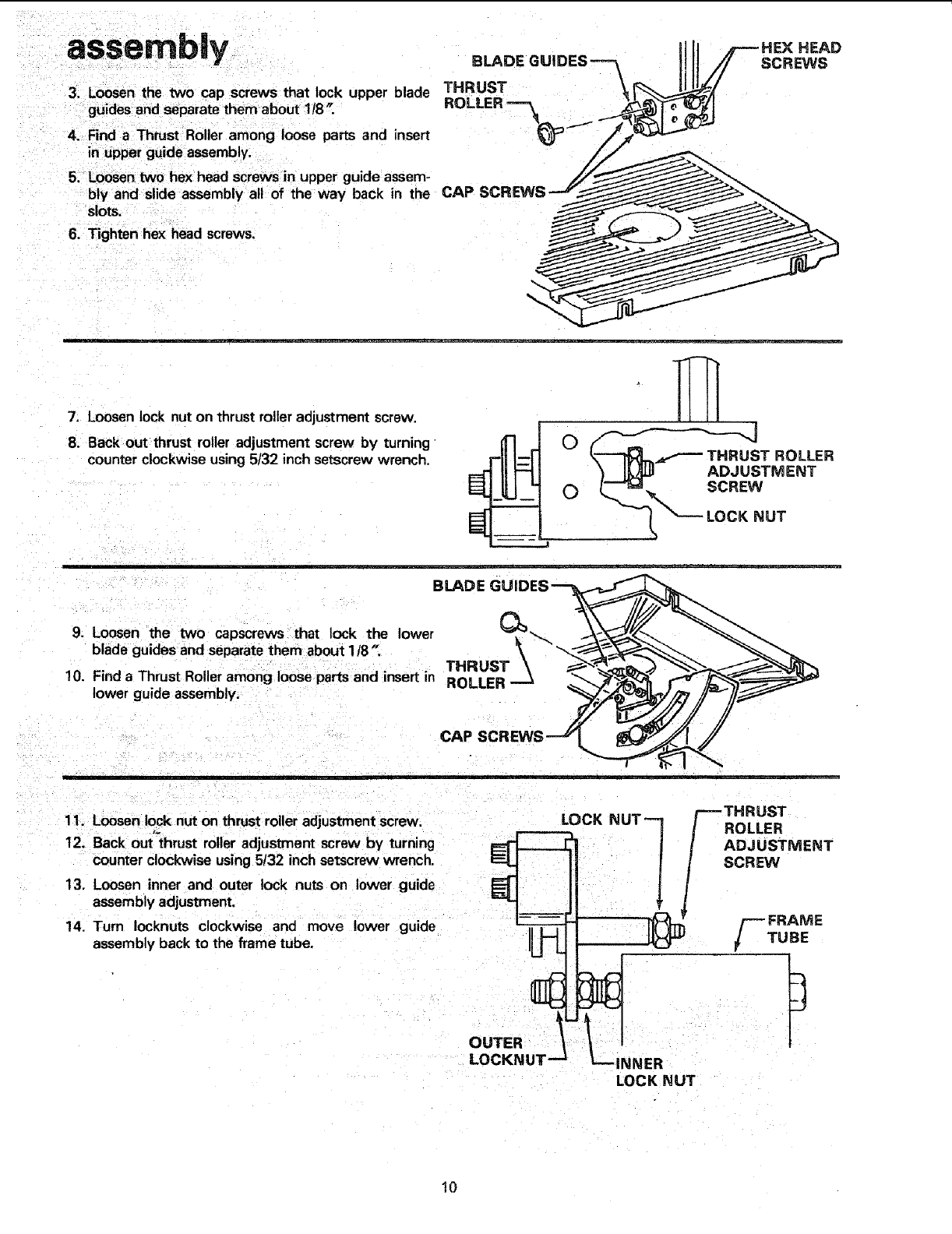
assembly BLADE GUIDES-_
3. Loosen the two cap screws that lock upper blade THRUST \
guidesand separate them about 1/8 _. ROLLER _.
4. Find a Thrust Roller among loose parts and insert _
in upperguido assembly.
5. Loosentwo hex head screws in upper guide assem-
bly and slide assembly all of the way back in the CAP
slots.
6. Tighten hex headscrews,
SCREWS
7. Loosen lock nut on thrust roller adjustment screw.
8. Back out thrust roller adjustment screw by turning
counter clockwise using 5/32 inch setscrew wrench.
J
JST ROLLER
ADJUSTMENT
SCREW
BLADE GUIDES ___
9. Loosen the two capscrews that lock the lower _____'_//_# _"_
blade guides and separatethem about 1/8". _ '
10. Find a Thrust Rolleramong loose partsand insert in THRUST __
lower guide assembly. ROLLER _
i
11, Loosen lock nut on thrust roller adjustment screw,
12. Back out'thrust roller adjustment screw by turn=ng
counter clockwise using 5/32 inch setscrew wrench.
13. Loosen inner and outer lock nuts on lower guide
assembly adjustment.
14. Turn Iocknuts clockwise and move lower guide
assembly back to the fTame tube.
OUTER
LOCKNU1
LOCi( NUT-- --THRUST
ROLLER
ADJUSTMENT
SCREW
Jp/---FRAME
TUBE
LOCK NUT
10
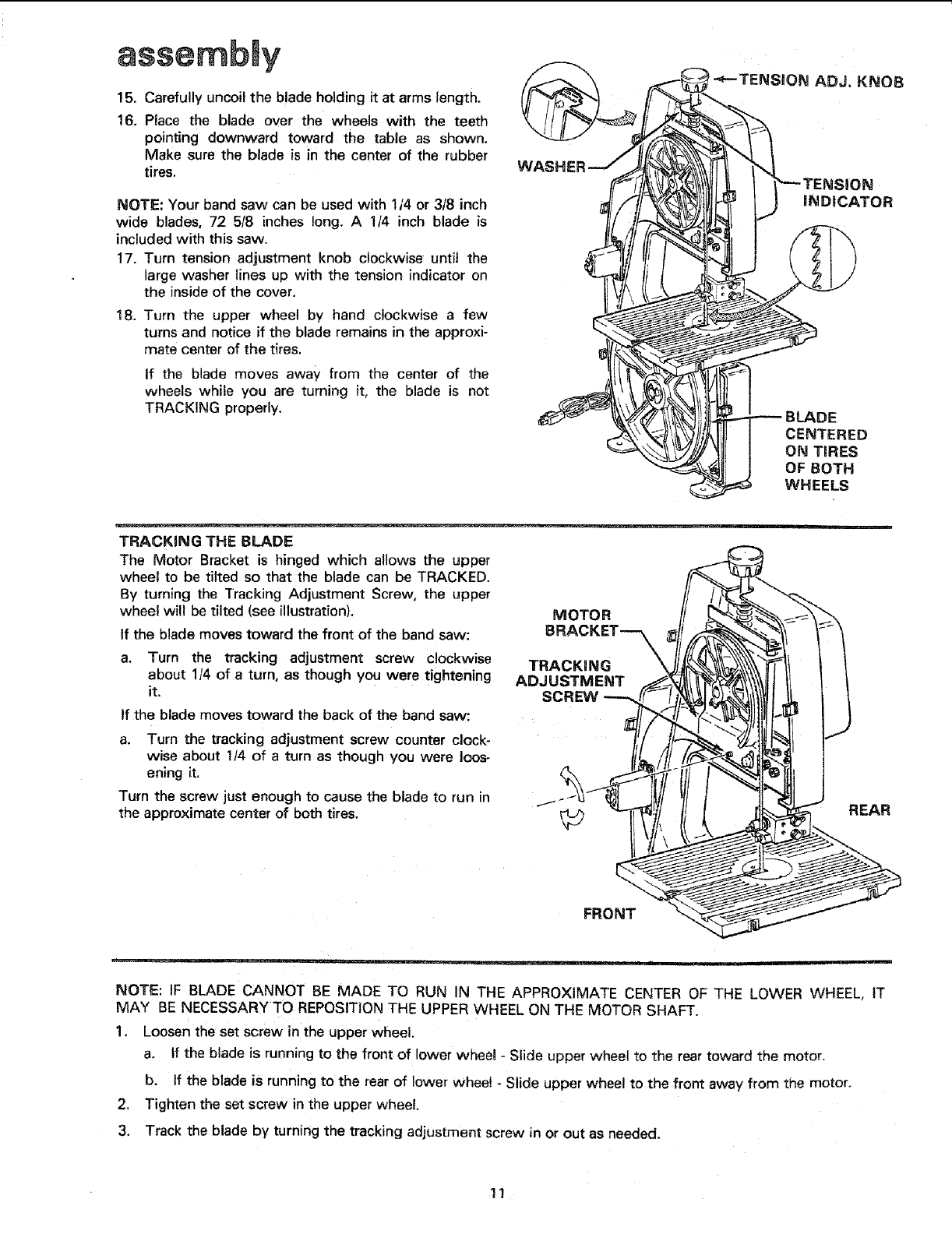
assembmy
15. Carefully uncoil the blade holding it at arms length.
16. Place the blade over the wheels with the teeth
pointing downward toward the table as shown.
Make sure the blade is in the center of the rubber
tires.
NOTE: Your band saw can be used with 1/4 or 3/8 inch
wide blades, 72 5/8 inches long. A 1/4 inch blade is
included with this saw.
17. Turn tension adjustment knob clockwise until the
large washer lines up with the tension indicator on
the inside of the cover.
18. Turn the upper wheel by hand clockwise a few
turns and notice if the blade remains in the approxi-
mate center of the tires.
If the blade moves away from the center of the
wheels while you are turning it, the blade is not
TRACKING properly.
WASHE
INDICATOR
CENTERED
ON TIRES
OFBOTH
WHEELS
TRACKING THE BLADE
The Motor Bracket is hinged which allows the upper
wheel to be tilted so that the blade can be TRACKED.
By turning the Tracking Adjustment Screw, the upper
wheel will be tilted (see illustration).
If the blade moves toward the front of the band saw:
a. Turn the tracking adjustment screw clockwise
about 1/4 of aturn, as though you were tightening
it.
If the blade moves toward the back of the band saw:
a. Turn the tracking adjustment screw counter clock-
wise about 1/4 of a turn as though you were loos-
ening it,
Turn the screw just enough to cause the blade to run in
the approximate center of both tires,
MOTOR
BRACKET---_
TRACKING_
ADJUSTMENT
SCREW
REAR
FRONT
' ......... ii i,
NOTE: IF BLADE CANNOT BE MADE TO RUN IN THE APPROXIMATE CENTER OF THE LOWER WHEEL, IT
MAY BE NECESSARY TO REPOSITION THE UPPER WHEEL ON THE MOTOR SHAFT.
1. Loosen the set screw in the upper wheel
a. If the blade is running to the front of lower wheel - Slide upper wheel to the rear toward the motor.
b. If the blade iS running to the rear of lower whee! - Slide upper wheel to the front away from the motor,
2. Tighten the set screw in the upper wheel.
3. Track the blade by turning the tracking adjustment screw in or out as needed.
1!
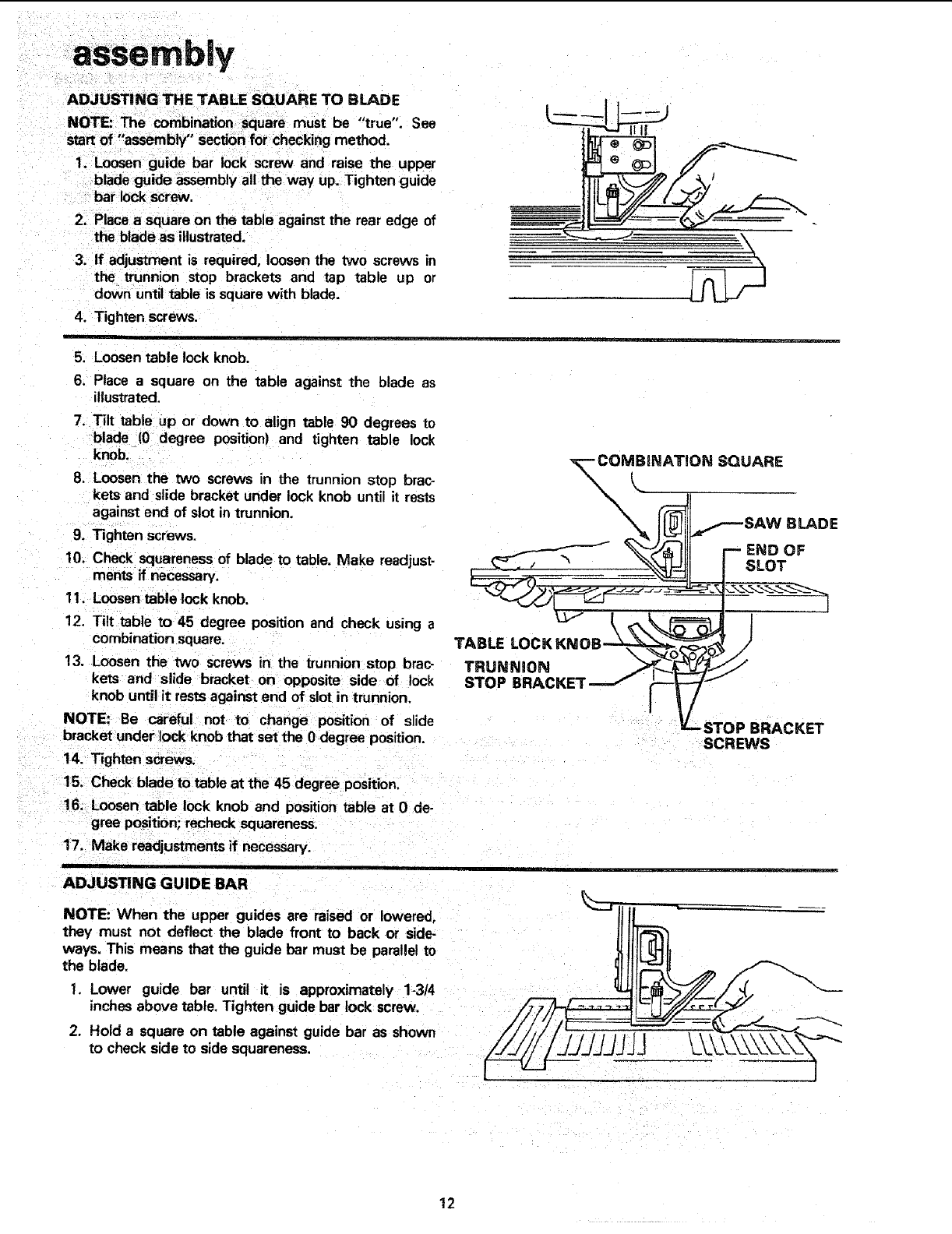
ADJUSTING THE TABLE SQUARE TO BLADE
NOTE: The combination square must be "true". Sea
start of "assembly" section for checkingmethod.
1. Loosen guide bar lock screw and raise the upper
blade guido assembly all the way up.Tighten guide
bar lockscrew.
2. Place a square on the table against the rear edge of
the blade as illustrated.
3. If adjustment is required, loosenthe two screws in
the trunnion stop brackets and tap table up or
down untiltable is square with blade.
4. Tighten screws.
5. Loosentable lock knob,
6. Place a square on the table against the blade as
illustrated.
7. Tilt table up or down to align table 90 degrees to
blade (0 degree position) and tighten table lock
knob.
8, Loosen the two screws in the trunnion stop brac-
kets and slide bracket under lock knob until it rests
against end of slot in trunnion,
9, Tighten scr_ews.
10. Check squareness of blade to table. Make readjust-
ments if necessary.
11. Loosen table lock knob.
12. Tilt table to 45 degree position and check using a
combination square,
13, Loosen the two screws in the trunnion stop brac-
kets and slide bracket on opposite side of lock
knob until it rests against end of slot in trunnion.
NOTE: Be careful not to change position of slide
_INATION SQUARE
TABLE LOCK KNOB
STOP BRACKET
bracket under lock knob that set the 0 degree position. SCREWS
!4. Tighten screws.
15. Check blade to table at the 45 degree position.
16. Loosen table lock knob and position table at O de=
gree position;recheck squareness.
17. Make readjustmentsif necessary.
ADJUSTING GUIDE BAR
NOTE Wh n " ' _'_ "_
:ethe upper guiaes are raised or lowered,
they must not deflect the blade front to back or side-
ways. This means that the guide bar must be parallelto Itl _fl
the blade, rt____/_
1. Lower guide bar until it is approximately 1-3/4 I_'_ ./_(, "_---
,nchesabovetab,eT,,htanguidebar,ockscrow _
2. Hold a square on table against guide bar as shown ////Y/_ __._
to check side to sde squareness, _///_._/_/_//_j_J ___._.___._______X__\
1
12
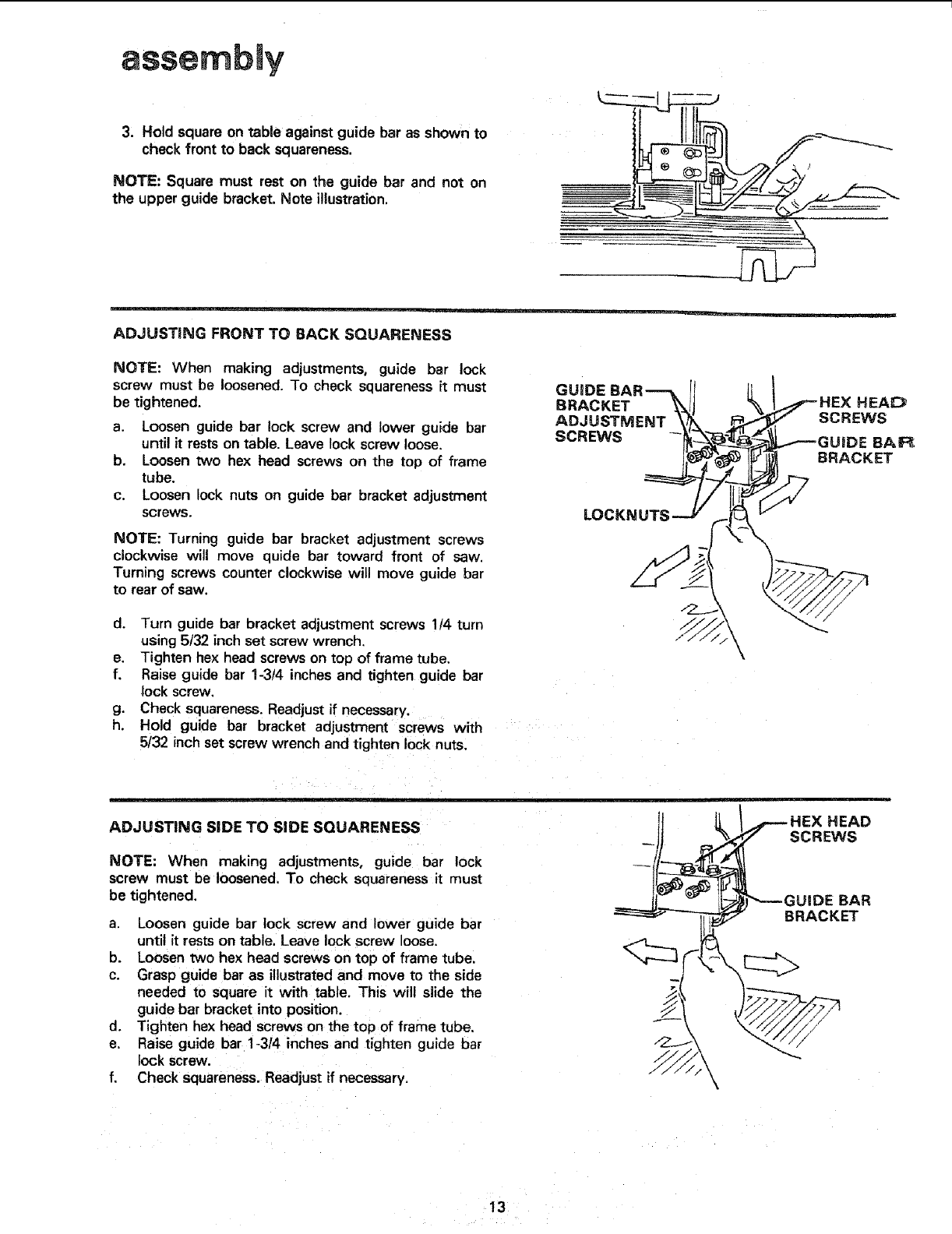
assembmy
3. Hold square on table against guide bar as shown to
check front to back squareness.
NOTE: Square must rest on the guide bar and not on
the upper guide bracket. Note illustration.
ADJUSTING FRONT TO BACK SQUARENESS
NOTE: When making adjustments, guide bar lock
screw must be loosened. To check squareness it must
be tightened.
a. Loosen guide bar lock screw and lower guide bar
until it rests on table. Leave lock screw loose.
b. Loosen two hex head screws on the top of frame
tube.
c. Loosen lock nuts on guide bar bracket adjustment
screws.
NOTE: Turning guide bar bracket adjustment screws
clockwise will move quide bar toward front of saw.
Turning screws counter clockwise will move guide bar
to rear of saw.
d. Turn guide bar bracket adjustment screws !/4 turn
using 5/32 inch set screw wrench.
e. Tighten hex head screws on top of frame tube,
f. Raise guide bar 1-314 inches and tighten guide bar
lock screw.
g, Check squareness. Readjust if necessary.
h. Hold guide bar bracket adjustment screws with
5/32 inch set screw wrench and tighten lock nuts.
GUIDE
BRACKET
ADJUST_
SCREWS
LOC_
HEAD
SCREWS
DE BAR
BRACKET
ADJUSTING SiDE TO SIDE SQUARENESS
NOTE: When making adjustments, guide bar lock
screw must be loosened. To check squareness it must
be tightened.
a. Loosen guide bar lock screw and lower guide bar
until it rests on table. Leave lockscrew loose.
b. Loosentwo hex head screws on top of frame tube.
c. Grasp guide bar as illustratedand move m the side
needed to square it with table. This will slide the
guide bar bracket into position.
d. Tighten hex head screws on the top of frame tube.
e, Raise guide bar 1-3/4 inches and tighten guide bar
lock screw.
f. Check squareness,Readjustif necessary.
m
HEAD
SCREWS
IIIDEBAR
BRACKET
!3
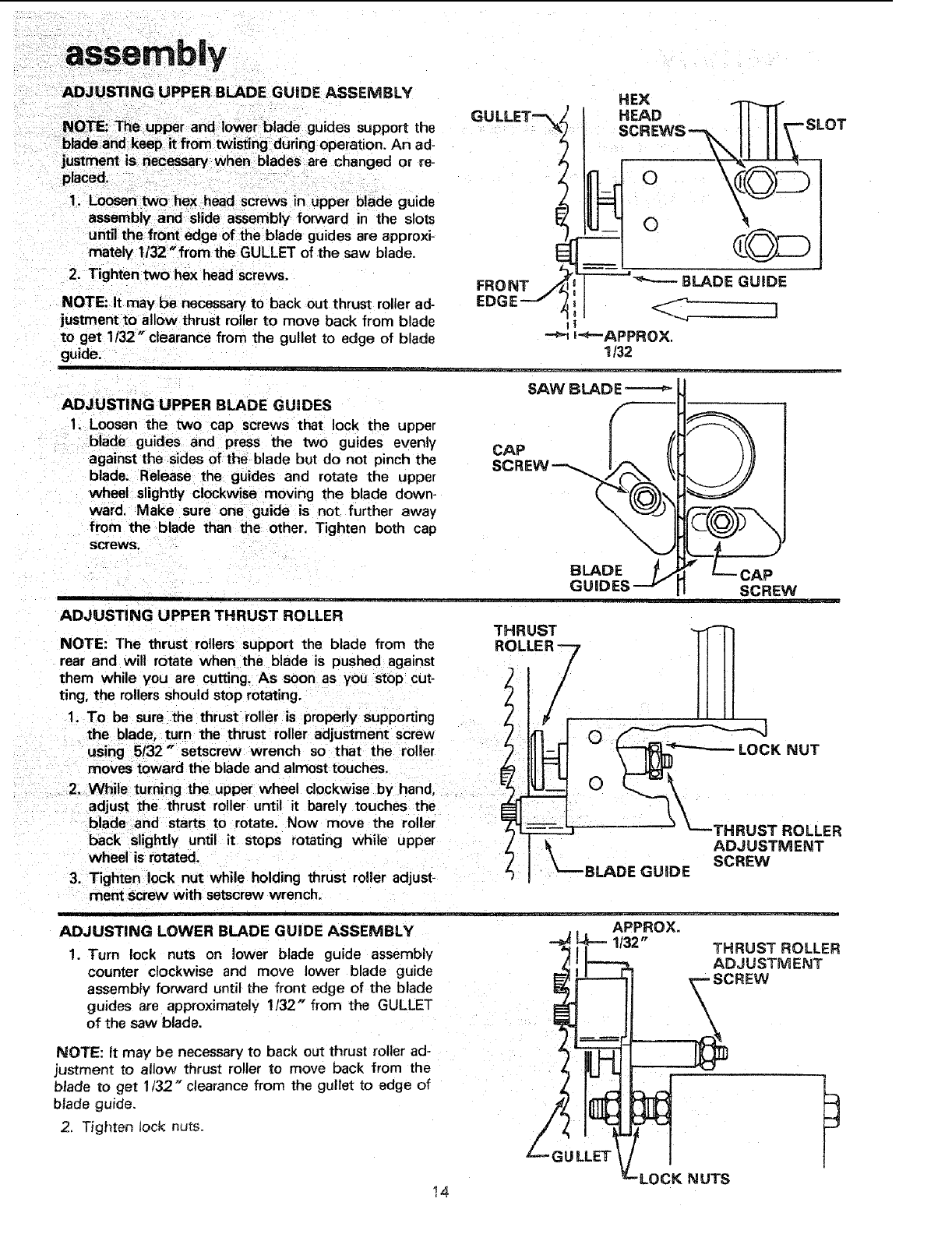
ADJUSTINGUPPERBLADEGUIDEASSEMBLY
GULLET--x4
placed.
1. Loosen two hex head screws in upper blade guide
assembly and slide assembly forward in the slots
until the front edge Ofthe blade guides are approxi-
mately 1132"from the GULLET of the saw blade.
2. Tighten two hex head screws.
NOTE: It may be necessaryto back out thrust relier ad-
justment to allow thrust roller to move back from blade
E
FRONT /,
EDGE----/
HEX
@o S
0
"'"--_"_"'-"-- BLADE GUIDE
to get 1/32" clearance from the gullet to edge of blade
guide.
ADJUSTING UPPER BLADE GUIDES
1. Loosen the two cap screws that lock the upper
blade guides and press the two guides evenly
against the sides of the blade but do not pinch the
blade. Release the guides and rotate the upper
wheel slightly clockwise moving the blade down-
ward. Make sure one guide is not further away
from the blade than the other. Tighten both cap
screws.
CAP
ADJUSTING UPPER THRUST ROLLER THRUST
NOTE: The thrust rollers support the blade from the ROLLER "-7
rear and will rotate when the blade is pushed against _/
them while you are cutting. As soon as you stop cut- Z /
ting, the rollers should stop rotating. Z /
1. To be sure the thrust roller is properly supporting Z_F-
the blade, turn the thrust roller adjustment screw /r_ j 0
using 5132 "setscrew wrench so that the roller "j -[c_J']
moves toward the blade and almost touches. _ [=_
w " _ O
2. While turning the upper hee clockw=se by hand,
adjust the thrust roller until it barely touches the |
blade and starts to rotate. Now move the roller
back slightly until it stops rotating while upper
wheel is rotated.
3. Tighten lock nut while holding thrust relier adjust-
ment screw with setscrew wrench.
LOCK NUT
_---TH RUST ROLLER
ADJUSTMENT
SCREW
GUIDE
ADJUSTING LOWER BLADE GUIDE ASSEMBLY
1. Turn lock nuts on lower blade guide assembly
counter clockwise and move lower blade guide
assembly forward until the front edge of the blade
guides are approximately 1132" from the GULLET
of the saw blade.
APPROX.
1/32" THRUST ROLLER
ADJUSTMENT
EW
NOTE: It may be necessary to back out thrust roller ad-
justment to allow thrust roller to move back from the
blade to get 1/32" clearance from the gullet to edge of
blade guide.
2. Tighten lock nuts.
!4
GU LLET
LOCK NUTS
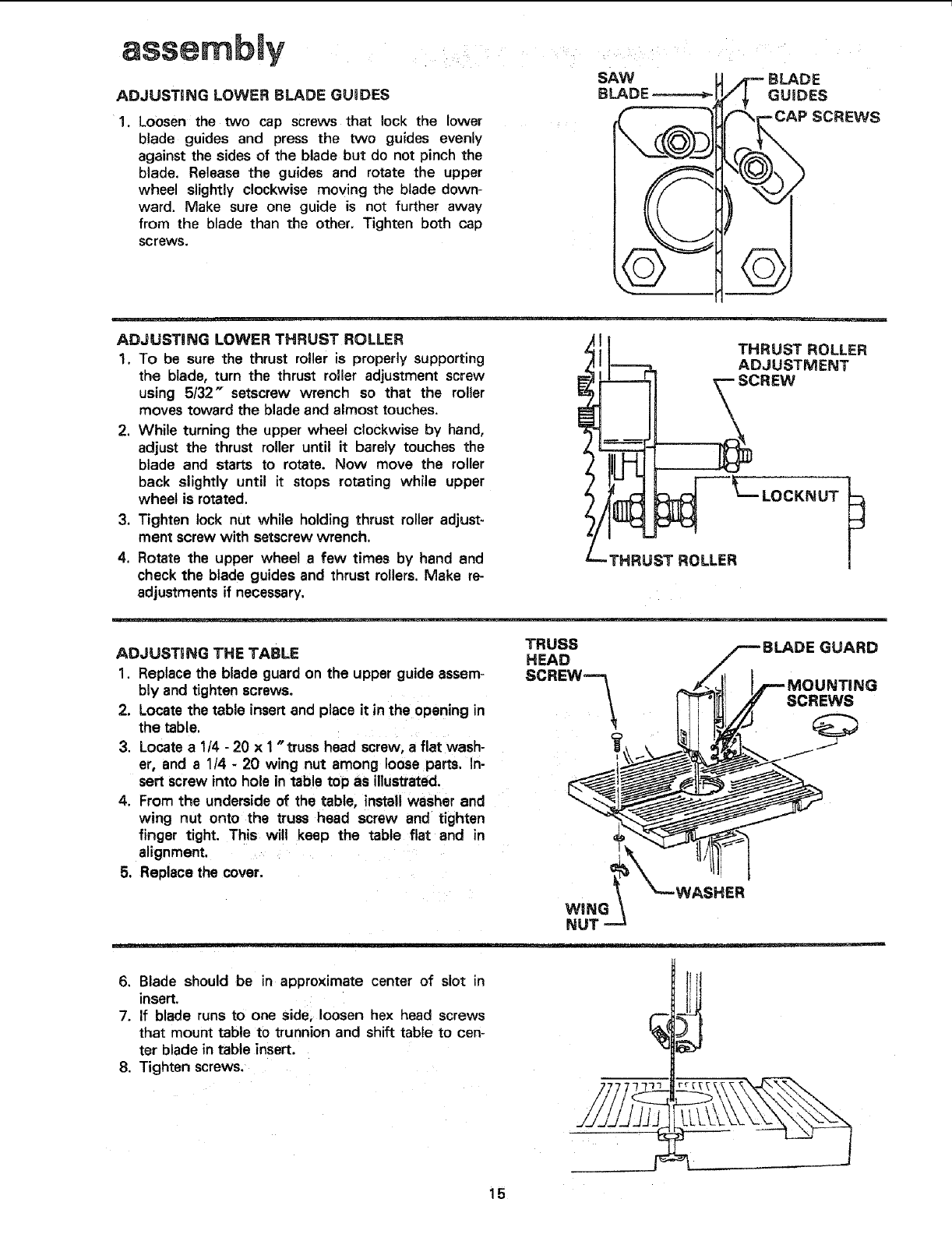
assembUy
ADJUSTING LOWER BLADE GUIDES
1. Loosen the two cap screws that lock the lower ....
blade guides and press the two guides evenly
against the sides of the blade but do not pinch the
blade. Release the guides and rotate the upper
wheel slightly clockwise moving the blade down-
ward. Make sure one guide is not further away
from the blade than the other. Tighten both cap
screws.
SAW
BLADE BLADE
GUIDES
SCREWS
ADJUSTING LOWER THRUST ROLLER
1. To be sure the thrust roller is properly supporting
the blade, turn the thrust roller adjustment screw
using 5/32" setscrew wrench so that the roller
moves toward the blade and almost touches.
2. While turning the upper wheel clockwise by hand,
adjust the thrust roller until it barely touches the
blade and starts to rotate. Now move the roller
back slightly until it stops rotating while upper
wheel is rotated.
3. Tighten lock nut while holding thrust roller adjust-
ment screw with setscrew wrench.
4. Rotate the upper wheel a few times by hand and
check the blade guides and thrust rollers. Make re-
adjustments if necessary.
THRUST ROLLER
ADJUSTMENT
__SCREW
-THRUST ROLLER
ADJUSTING THE TABLE
1. Replace the blade guard on the upper guide assem-
bly and tighten screws.
2. Locate the table insert and place it in the opening in
the table.
3. Locate a 114- 20 x 1"truss head screw, a flat wash-
er, and a 1/4 - 20 wing nut among loose parts. In-
sert screw into hole in table top as illustrated.
4. From the underside of the table, install washer and
wing nut onto the truss head screw and tighten
finger tight. This will keep the table flat and in
alignment.
5, Replace the cover.
TRUSS GUARD
HEAD
SCREW=-_ 3
SCREWS
6. Blade should be in approximate center of slot in
insert.
7. If blade runs to one side, loosen hex head screws
that mount table to trunnion and shift table to cen-
ter blade in table insert.
8. Tighten screws.
7777
JJJJJ
15
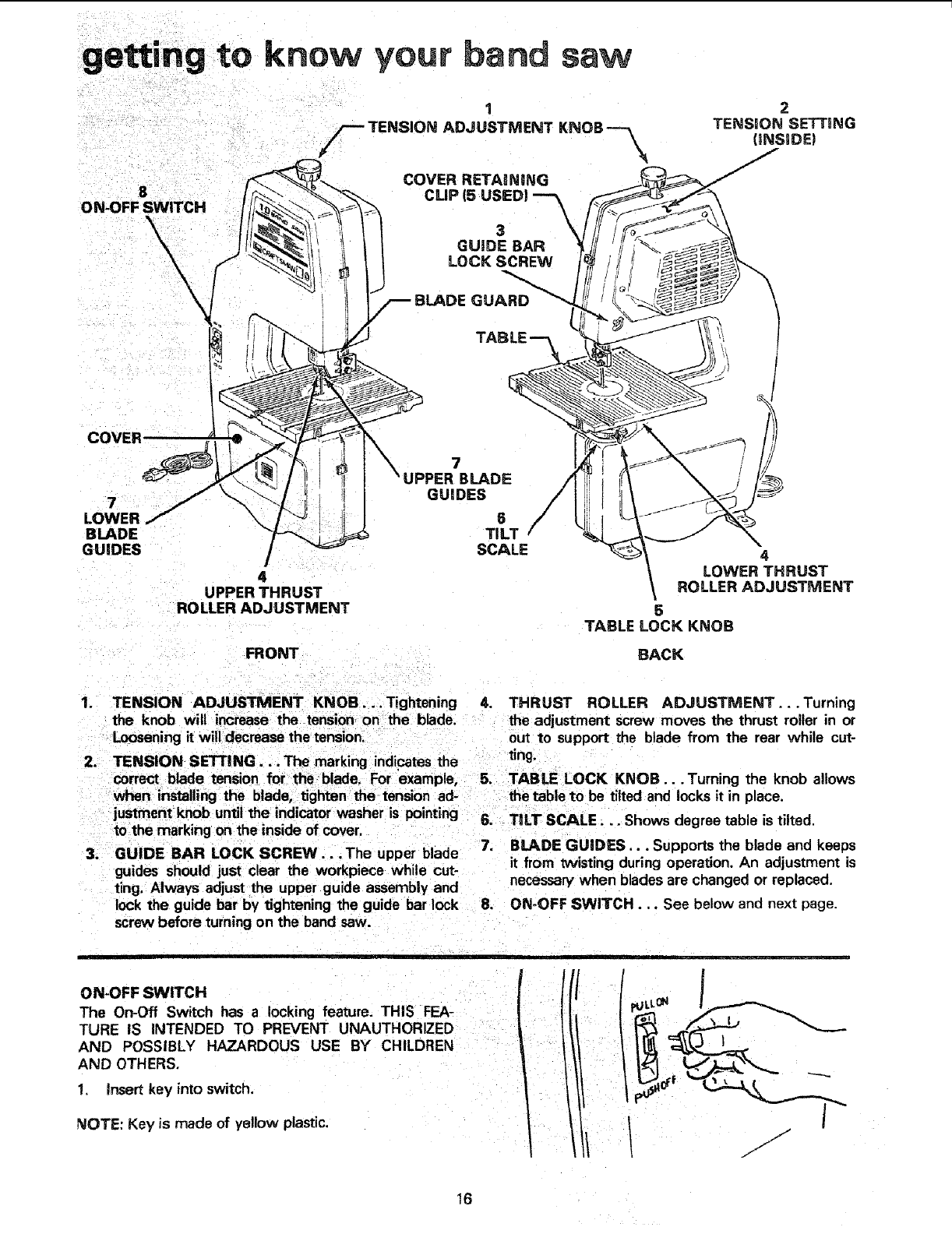
8
ON-OFF SWITCH
\
1
DN ADJUSTMENT KNOB---_
COVER RETAINING
CLiP (5 USEDJ
3
GUIDE BAR
LOCK SCREW
2
TENSION SETTING
(BNSIDE)
BLADE
GUIDES
\
4
UPPER THRUST
ROLLER ADJUSTMENT
GUARD
7BLADE
GUmDES
8
TILT
SCALE 4
LOWER THRUST
ROLLER ADJUSTMENT
|
5
TABLE LOCK KNOB
FRONT BACK
1. TENSION ADJUSTMENT KNOB .... Tightening 4. THRUST ROLLER ADJUSTMENT...Turning
the knob will increase the tension on the blade, the adjustment screw moves the thrust roller in or
Loosening it willdecrease the tension, out to support the blade from the rear while cut-
2. TENSION SETTING... The marking indicates the ring.
correct blade tension for the blade. For example, 5. TABLE LOCK KNOB... Turning the knob allows
when installing the blade, tighten the tension ad- the table to be tilted and locks it in place.
justment knob until the indicator washer is pointing 6. TILT SCALE... Shows degree table is tilted.
to the marking on the inside of cover.
3. GUIDE BAR LOCK SCREW...The upper blade 7. BLADE GUIDES... Supports the blade and keeps
guides should just clear the workpiece while cut- it from twisting during operation. An adjustment is
ting. Always adjust the upper guide assembly and necessary when blades are changed or replaced.
lock the guide bar by tightening the guide bar lock 8. ON-OFF SWITCH... See below and next page.
screw before turning on the band saw.
ON-OFF SWITCH
The On-Off Switch has a locking feature. THIS FEA-
TURE IS INTENDED TO PREVENT UNAUTHORIZED
AND POSSIBLY HAZARDOUS USE BY CHILDREN
AND OTHERS.
1. Insert key into switch.
NOTE: Key is made of yellow plastic, I r//
pULLON /
/ ./
16

getting to know your band
2. To turn machine on, insert finger under switch lever
and pull end of switch out.
saw
3. To turn machine OFF... PUSH lever in. f p_LL0_
NEVER LEAVE THE MACHINE UNATTENDED I
UNTIL IT HAS COME TO A COMPLETE STOP.
4. To lock switch in OFF position.., hold switch IN
with one hand.., REMOVE key with other hand.
WARNING: FOR YOUR OWN SAFETY, ALWAYS
LOCK THE SWITCH "OFF" WHEN MACHINE iS
NOT IN USE ... REMOVE KEY AND KEEP iT BN A
SAFE PLACE... ALSO... iN THE EVENT OF A
POWER FAILURE [ALL OF YOUR LIGHTS GO OUT}
TURN SWITCH OFF... REMOVE THE KEY AND
STORE iT REMOTE FROM BAND SAW. THaS WiLL
PREVENT THE MACHINE FROM STARTING UP
AGAIN WHEN THE POWER COMES BACK ON,
[_ PULL
basic band saw operation
A band saw is basically a "curve cutting" machine. It is also used for straight-line cutting operations such as cross-
cutting, ripping, mitering, beveling, compound cutting, and resawing. It is not capable of doing inside cutting.
This band saw is not designed to cut metal
SAWI N G
1. Adjust the upper guide assembly to just clear the
workplece.
2. Use both hands while feeding the work into the
blade. Hold the workpiece firmly against the table.
Use gentle pressure, and do not force the work, but
allow the blade to cut.
.The smallest diameter circle that can be cut out is
determined by the width of the blade. For example,
a 1/4" wide blade will cut aminimum diameter of
approximately 1-1/2": (See Chart)
BLADE SELECTION GUIDE FOR
MINIMUM CIRCLE CU'I'rING
BLADE SIZE 1t4" 3t8"
17
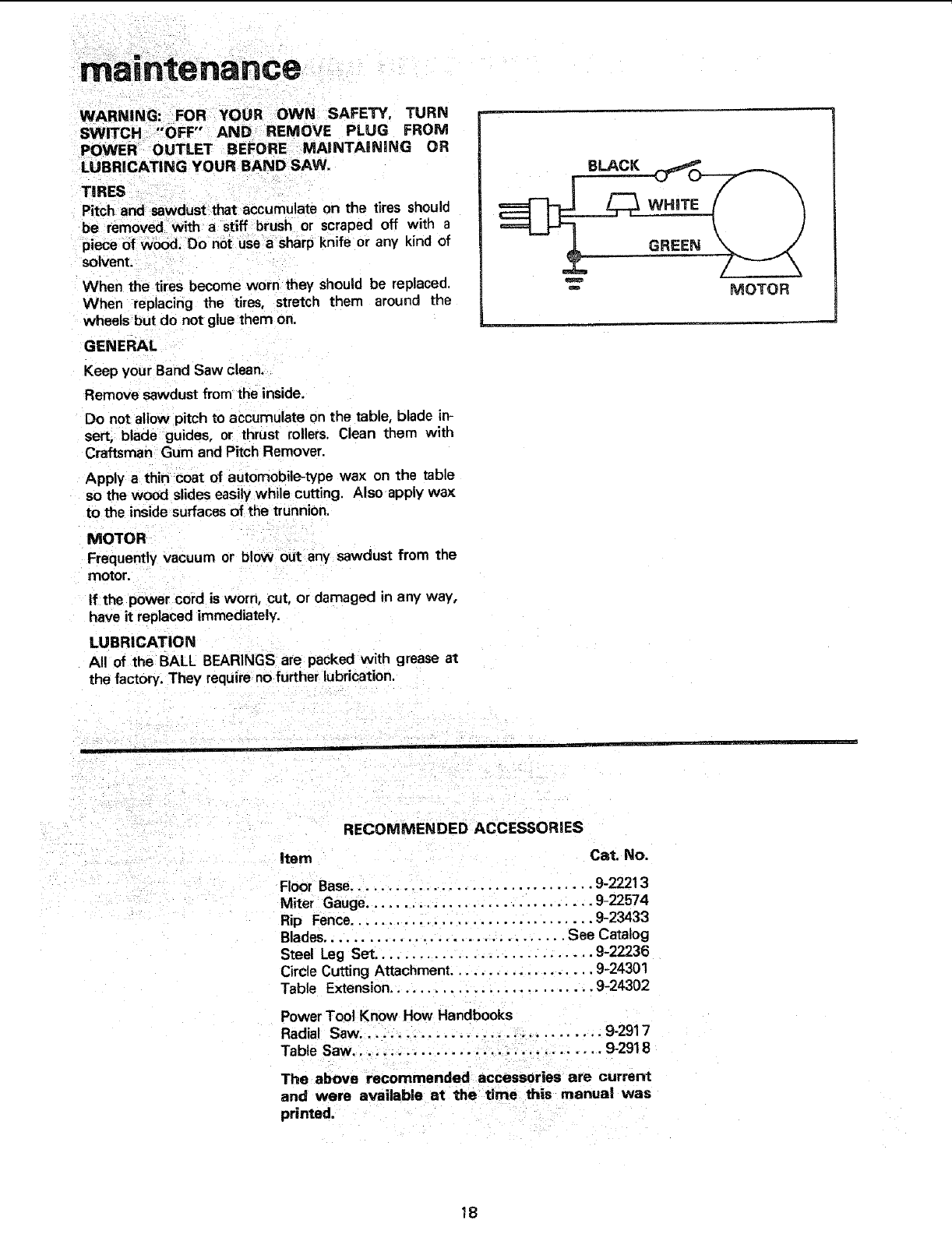
ntenance
WARNING: FOR YOUR OWN SAFETY, TURN
SWITCH "OFF" AND REMOVE PLUG FROM
POWER OUTLET BEFORE MAiNTAiNiNG OR
LUBRICATING YOUR BAND SAW.
TIRES
Pitch and sawdust that accumulate on the tires should
be removed witha stiff brush or scraped off with a
piece of wood. Do not use a sharp knife or any kind of
solvent.
When the tires become worn they should be replaced.
When replacing the tires, stretch them around the
wheels but do not glue them on.
GENERAL
Keep your Band Saw clean,
Remove sawdust from the inside.
Do not allow pitch to accumulate on the table, blade in-
sert, blade guides, or tl_rust rollers. Clean them with
Craftsman Gum and Pitch Remover,
Apply athin coat of autornobile-Wpe wax on the table
so the wood slides easily while cutting. Also apply wax
to the inside surfaces of the trunnion.
MOTOR
Frequently vacuum or blow out any sawdust from the
motor.
If the power cord is worn, cut, or damaged in any way,
have it replaced immediately.
LU BRICATION
All of the BALL BEARINGS are packed with grease at
the factory. They require no further lubrication.
BLACK
m MOTOR
RECOMMENDED ACCESSORIES
Item Cat. No.
Floor Base................................ 9-22213
Miter Gauge.......................... 9-22574
Rip Fence................................ 9-23433
Blades................................ See Catalog
Steel Leg Set. ............................ 9-22236
Circle Cutting Attachment ................... 9-24301
Table Extension ........................... 9-24302
Power Tool Know How Handbooks
Radial Saw ................................ 9`2917
Table Saw................................. 9-2918
The above recommended accessories are current
and were available at the time this manual was
printed.
18

troubleshooting
WARNING: FOR YOUR OWN SAFETY, TURN SWITCH "OFF" AND REMOVE PLUG FROM POWER
SOURCE OUTLET BEFORE TROUBLESHOOTING YOUR BAND SAW.
TROUBLE
Motor wiB not run.
Blade does not run in the
approximate center of the
upper wheel.
Blade does not run in thei
approximate center of the
lower wheel.
Band Saw slows down
when cutting.
B_ades breaking.
PROBABLE CAUSE
1. Defective On-Off switch.
Defective switch cord.
Defective switch box receptacle.
2. Motor Defective,
1, Not tracking properly.
1. Upper wheel not positioned
correctly on shaft.
1. Cutting too small a radius.
2. Dull blade.
1. Too much tension.
2. Kink in blade caused by cutting
too small aradius or turning the
material too fast when cutting,
REMEDY
1. Replace defective parts before using
Band Saw again.
2. Consutt Sears Service. Any attempt to repair
this motor may create a HAZARD unless
repair is done by a qualified service technician.
Repair service is available at your nearest Sears
Store.
1. Adjust tracking, see Assembly Section,
"Tracking the Blade."
1. Reposition the wheel, see Assembly
Section, "Tracking the Blade."
1. Stop feeding, and back up to the material
slightly, until the band saw speeds up.
2. Replace blade.
1. Adjust tension. See Getting To Know
Your Band Saw "Tension Setting".
2. Use correct cutting technique. See Basic
Band Saw Operation Section.
FIGURE 1
SUPPUED WITH MODEL 113.244420
J
12 a11 tl
Key
No. Part No. Description
! I 62614
2i60314
2 STD541025
4 STD551225
5 68060
7 68059
8 62615
11 STD541050
12 803835
69097
Leg
t'Screw Truss Hd. 114-20 x5iB
t_Nut Hex 1t4-20
t*Lockwasher, 1/4 External
Channel, Support
Stiffener, Side
Stiffener, End
t'Nut, Hex Hd. 1/2-13
t Foot, Leveling
*Bag of Loose Parts
HARDWARE FOR MOUNTING TOOL
STD523110 t'Screw, Hex Hd. 5/1618 x 1
STD551131 1"*Lockwasher Ext. 5/! 6
STD541231 )'*Nut, Hex 51!6-18
STD551031 T'Washer 11!32 ID
" Standard Hardware item - May Be Purchased Locally
1"Al! Parts Contained In Loose Parts Bag
19
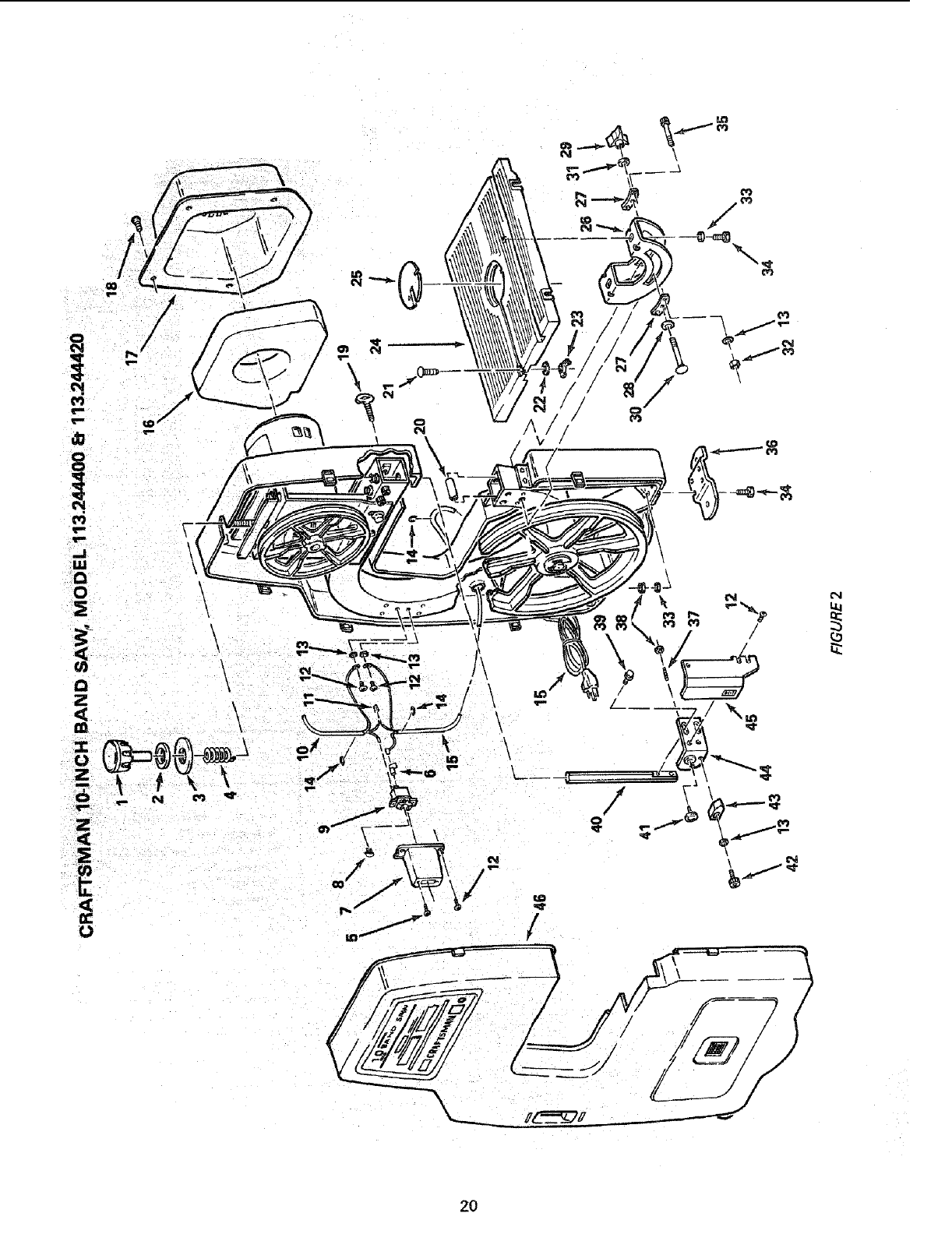
._....-.-_
/
L , !\_
/
/
2O
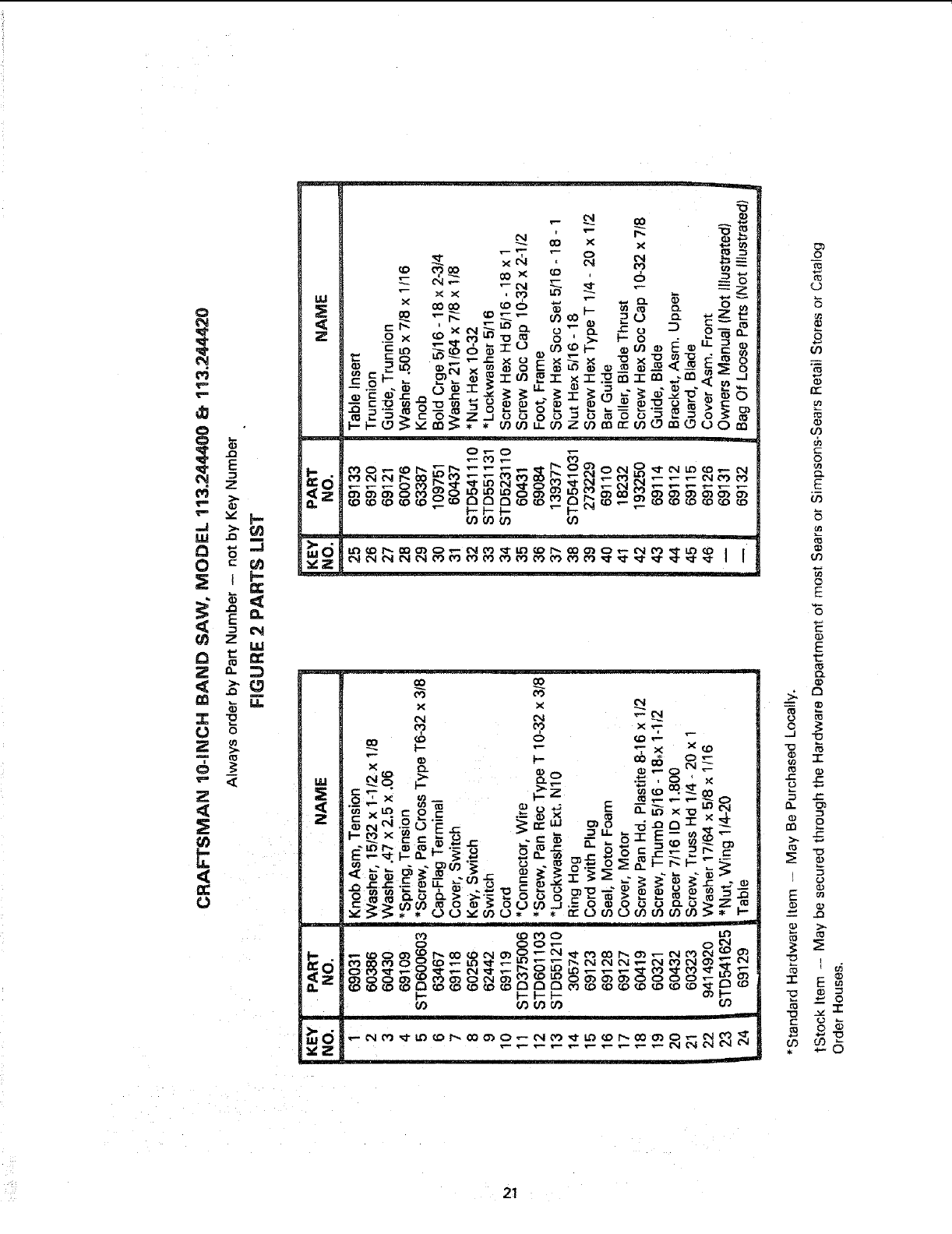
c_
S
.=
o
oO
_J
03
c
o
E
_3
L
o_
_0
oo
0
E
"6
E
r_j
E
C_
I=
(,3
OJ
E
-r
crJ
>,
_o
E==
.._ "r"
_o
21
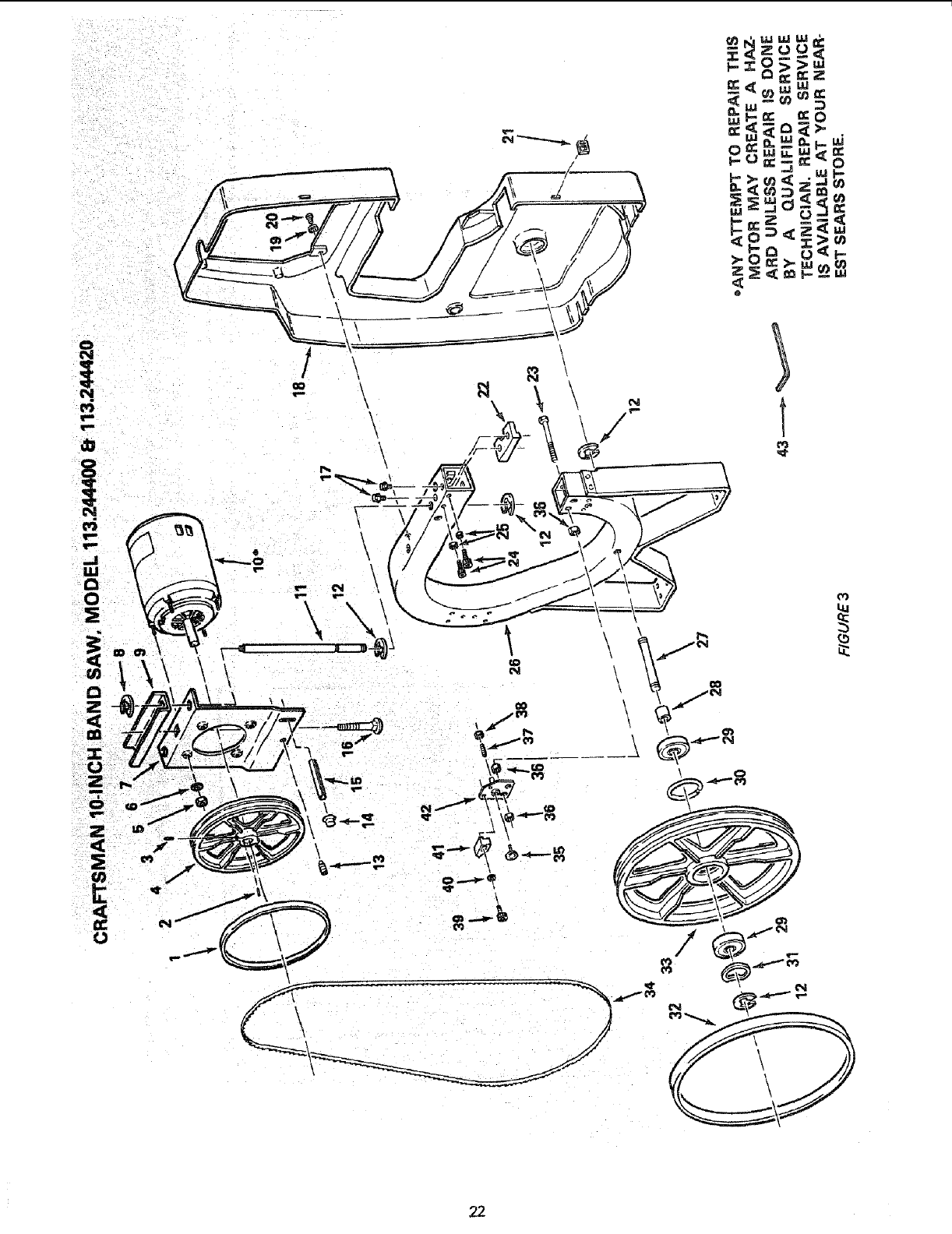
_w
_ ww
@
\
N
_J
\
\\
\
j ®i_
22
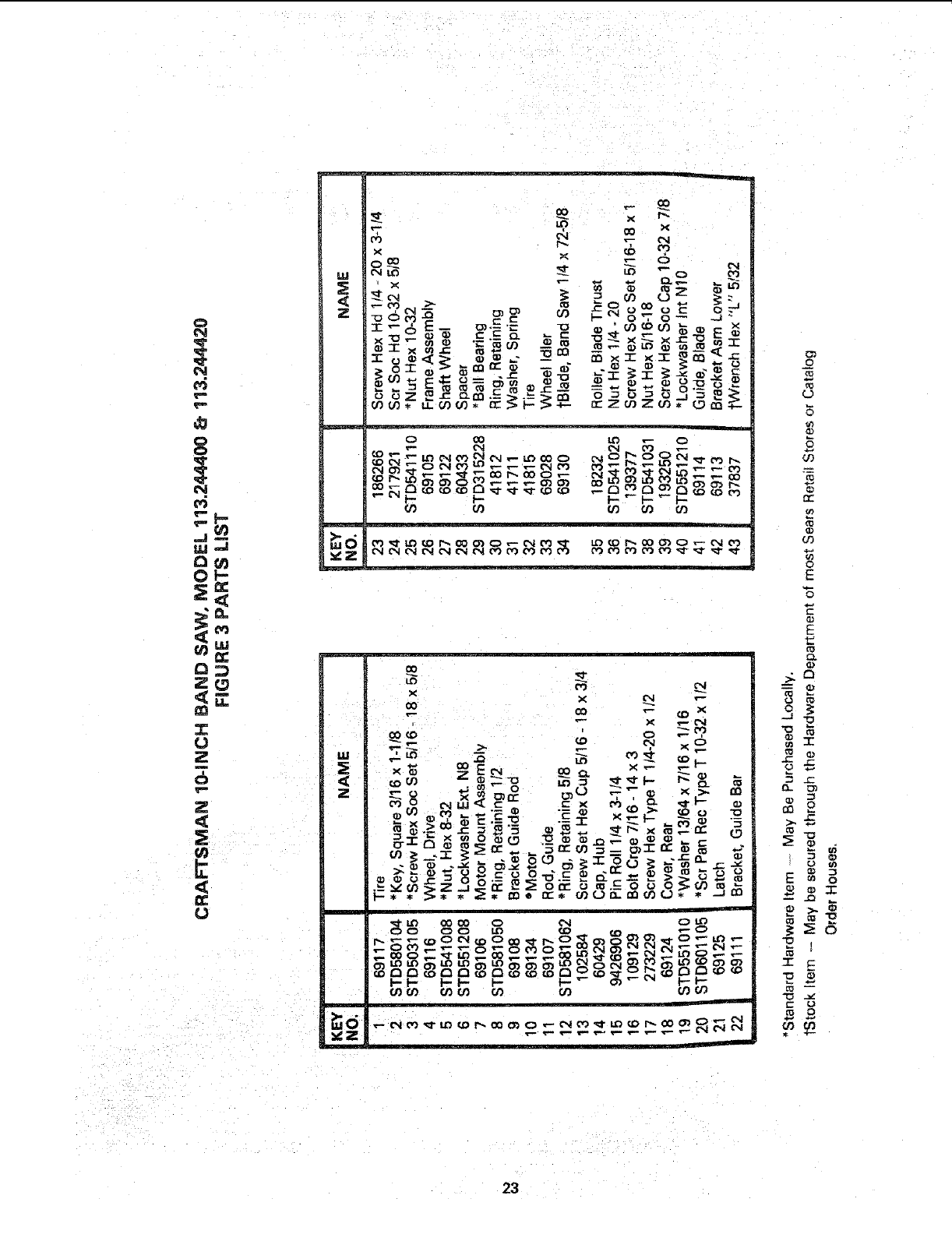
0
_4
8
O_-
Z_
m
Z
z
W
i _ i_ i
' i
e_
X
o_
_11,0
'x
I_._(_ _-C_
X"O,- _ _ ._--'_
o _Z _x: ,-,m c_._.,-
_ X
Off) C) _
I
0
i
oo
LO
X
oO x _ _-
,... 00 _ _ X
x_ _E_ ooc_ x_ _
_..'r, X_0_("J _ _I_ _._ _ _ _ _
.__v_z_a: m:_ on" o _.- co o o._e3 _
-
F
_o
_J
€€%
CX:
o,)
0
E
_b
E
{o
r_
a,)
"0
6
O- Co
6_
E_8
-r E
p_
23
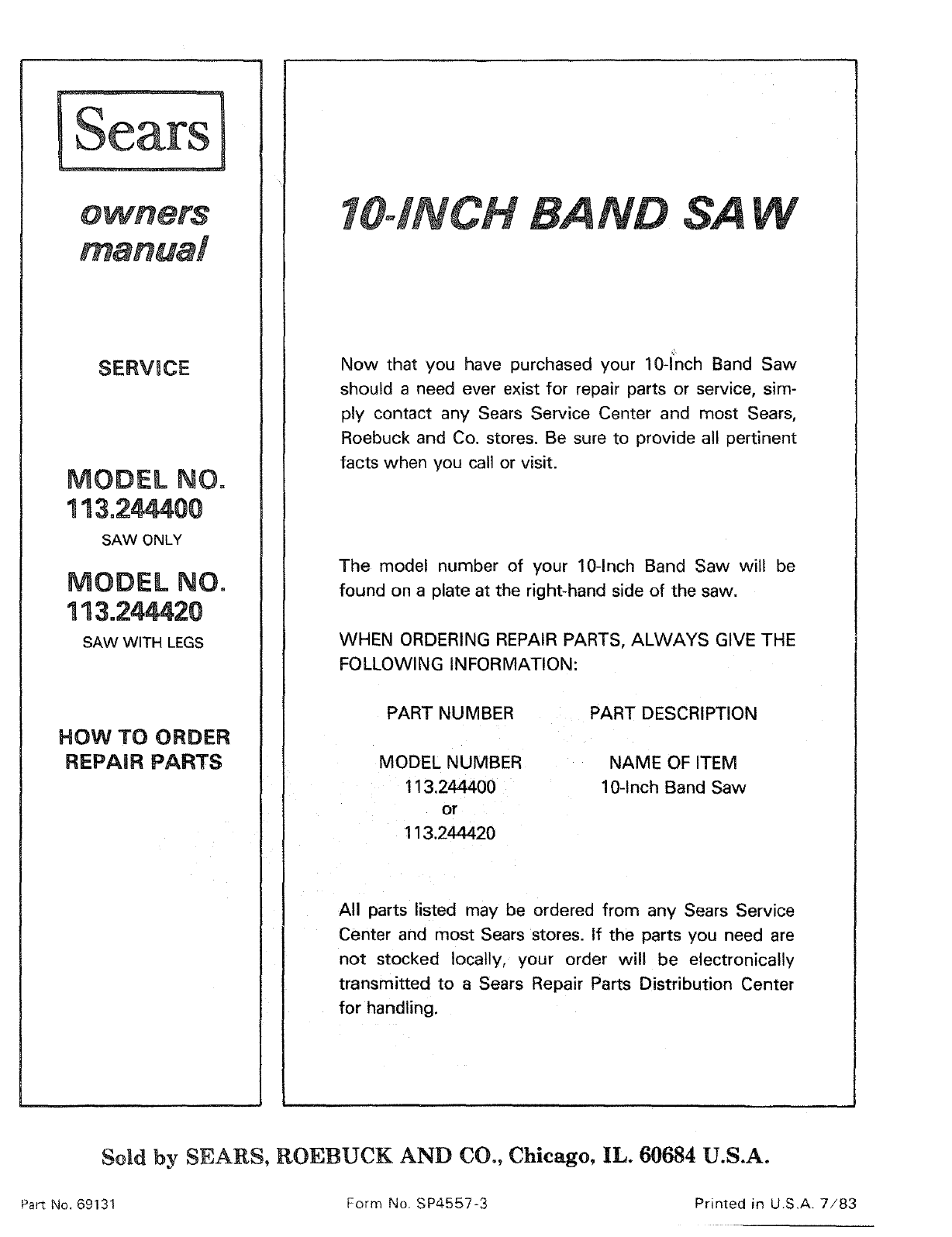
Sears
SERVICE
MODEL NO=
113,244400
SAW ONLY
MODEL NO.
113.244420
SAW WITH LEGS
HOW TO ORDER
REPAIR PARTS
10JNCH SAW
Now that you have purchased your 10-inch Band Saw
should a need ever exist for repair parts or service, sim-
ply contact any Sears Service Center and most Sears,
Roebuck and Co. stores. Be sure to provide all pertinent
facts when you call or visit.
The model number of your 10-Inch Band Saw will be
found on a plate at the right-hand side of the saw.
WHEN ORDERING REPAIR PARTS, ALWAYS GIVE THE
FOLLOWING INFORMATION:
PART NUMBER PART DESCRIPTION
MODEL NUMBER
113.244400
or
113.244420
NAME OF ITEM
10-Inch Band Saw
All parts listed may be ordered from any Sears Service
Center and most Sears stores. If the parts you need are
not stocked locally, your order will be electronically
transmitted to a Sears Repair Parts Distribution Center
for handling.
Sold by SEARS, ROEBUCK AND CO., Chicago, IL. 60684 U.S.A.
Part No. 69131 Form No. SP4557-3 Printed in U.S.A. 7/83